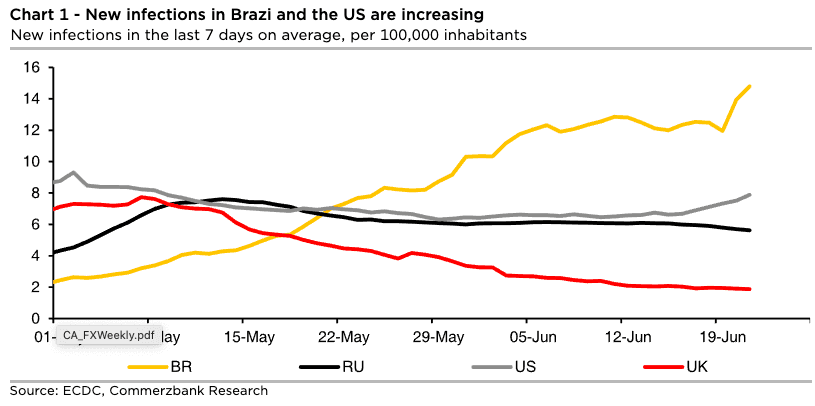Pound Sterling Shakes Covid Caution at Start Week to Turn Higher against Dollar and Euro
- Expect GBP to be subject to global factors this week
- Markets maintain concern over U.S. covid infection rates
- Eyes on Tuesday's UK PMI data for flavour of economic recovery

Image © Adobe Images
After a soft start to the new week the British Pound has turned higher against the Euro, Dollar and a host of other currencies following the opening of European equity markets, which remain highly sensitive to news the U.S. continues to see covid-19 cases rise.
With little by way of Bank of England and Brexit news expected over coming days the global and domestic picture relating to covid-19 will be of greater significance, with markets weighing up some fresh data from the UK economy on Tuesday as well as signs of growing global infection rates.
"Markets have climbed back into the green after early losses, with stocks proving the doubter wrong yet again as a world of stimulus trumps the reality of economic and health struggles," says Joshua Mahony, Senior Market Analyst at IG. "While the US remains a key concern in the coronavirus battle, the UK is preparing to loosen the shackles on the services industry as the 2m rule comes under review tomorrow. With pubs, cafes, restaurants, and hotels set to open their doors next month, there is a feeling that the second half will be the beginning of the big bounce back for businesses."
Asian markets traded in a relatively volatile fashion on Monday, but it appears that European markets have injected some confidence into the fray as they went higher on the open, triggering a rally in the Pound.
The Pound-to-Euro exchange rate is trading 0.33% higher at 1.1083 at the time of writing having fallen 0.80% last week, while the Pound-to-Dollar exchange rate is 0.60% higher at 1.2421, having fallen 1.50% last week.
Global stock markets are of importance for Sterling which tends to underperform the likes of the Dollar, Euro, Yen and Franc when markets are selling off; but it does tend to advance against the New Zealand Dollar and Australian Dollars under such circumstances. The attraction of broader market trends tends to grow when domestic news concerning Brexit and the Bank of England is sparse, which is likely to be the case this week as there are no scheduled events involving either.
Should equity markets push higher over coming days there a likelihood that Sterling will find itself better supported.
A key risk to the market outlook does however remain the ongoing rise in global covid-19 infections as the number of reported new infections worldwide has reached a new high of 183K, with 116K of this being in the Americas.
The nationwide infection rate in the U.S. has risen again to 7.9 per 100K while in Brazil 14.8 cases per 100K inhabitants have been announced.
"Markets kicked off the week on a mixed note, as investors couldn’t decide on where to go next as two major opposite forces muddle the sentiment at the moment: the rise in new coronavirus cases and the massive monetary and fiscal interventions," says Ipek Ozkardeskaya, market analyst at Swissquote Bank. "Low volumes and high volatility were on the menu of Monday."
Despite the relative relief for Sterling on Monday, it must be emphasised that the near-term trend against both the Euro and Dollar is still lower, and for now any strength in Sterling will likely prove limited.
Secure a retail exchange rate that is between 3-5% stronger than offered by leading banks, learn more.
The Dollar has appeared to find its feet since covid-19 concerns started to rise in the U.S. again, and should this theme play out further over coming days we might expect further gains at the expense of the Pound and Euro.
"Concerns of a second wave of the COVID-19 pandemic and weak economic data remain the main catalysts in the FX markets and are translating into a higher USD across the board. After all, the greenback remains the safe-haven currency of choice when risk aversion resurfaces across markets, prevailing over the JPY and the CHF. This resulted in what has become a familiar pattern this year, with both the EUR and GBP dragged lower and below 1.12 and 1.24 respectively," says Roberto Mialich, FX Strategist at UniCredit Bank in Milan.
"The number of new infections nationwide has increased by 15% in the last two weeks. Over the weekend, seven of the 50 U.S: states recorded record levels of new infections. However, the number of deaths continues to decline, falling by more than 40% in the last 14 days alone," says Dr. Christoph Balz at Commerzbank.
The broader market place remains locked onto the covid-19 story, even if there are signs of continued improvement in the number of cases being reported in the Eurozone and UK. Here infections and deaths continue to fall as the economy opens up, but we would expect anxieties to linger as long as the global infection picture remains of concern.
"This further reinforces our view that the currency markets remain a risk-on/risk-off story this year, which increases intraday swings and makes it difficult for clear trends to emerge," says Mialich.
How economies exit from lockdown will also be key to how currencies perform over coming weeks and days.
The UK is looking to announce the further unlocking of the economy in early July with the hospitality sector, pubs and restaurants being allowed to open again. This should provide an element of support for the domestic economy, however the UK remains weeks behind the EU and US in terms of unlocking which could see some relative underperformance in the data.
"We maintain a cautious near-term outlook for the GBP in view of the very negative growth impact of the Covid-19 pandemic on the UK economy," says Valentin Marinov, Head of G10 FX Strategy at Crédit Agricole. "The GBP is undervalued and oversold, but weak growth outlook and Brexit uncertainty could keep it close to the lows for most of this year."
With this in mind, watch the release of preliminary PMI data for June on Tuesday which should give a flavour of the UK's performance relative to the Eurozone.
"This month’s ‘flash’ PMI reading (tomorrow) will again be influenced mainly by the extent of reopening of the economy at the time when the fieldwork for the survey was conducted. As lockdown restrictions were eased from mid-May onwards, businesses have been reopening. With the ‘flash’ survey typically conducted sometime in the middle two weeks of the month, that gradual reopening of the economy should, even if retail is excluded from the survey, ensure that the Services PMI shows further improvement this month," says Adam Cole, Chief Currency Strategist at RBC Capital Markets.
Should data beat expectations then the Pound could find some upside support, but a disappointment could only pile on the gloom that seams to have beset the Pound over recent weeks.

